The humble peanut may help boost your overall wellness and nutrition. In one straightforward sentence: Eating peanuts supports key health markers like heart-health, blood sugar balance, and nutrient intake. Understanding how peanuts fit into your diet matters because they’re nutrient-dense, widely available, and may deliver multiple wellness benefits when consumed properly. We’ll explore ten evidence-based advantages, view the nutrition profile of peanuts, cover safe intake and precautions, and wrap up with frequently asked questions.
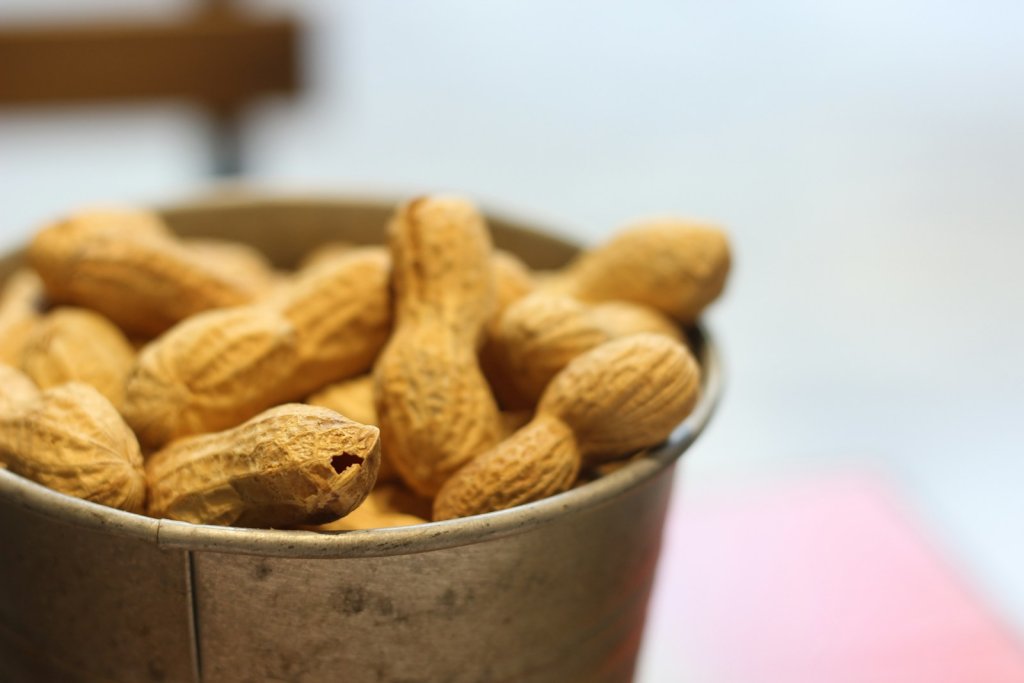
What Makes Peanuts So Healthy?
Peanuts are one of the most nutrient-dense foods available, offering an excellent balance of protein, healthy fats, fiber, and essential vitamins and minerals. They are technically legumes but share a nutrient profile similar to tree nuts — delivering a powerhouse of nutrients in a small serving.
From a scientific standpoint, peanuts provide a balanced ratio of macronutrients (roughly 25% protein, 50% fat, and 15% carbohydrates), along with micronutrients that support overall wellness. Their unsaturated fats (mainly oleic and linoleic acids) support cardiovascular health, while plant-based protein aids in muscle repair and satiety.
Peanuts also contain niacin, vitamin E, magnesium, manganese, and folate, which play vital roles in energy metabolism, antioxidant defense, and brain function. Combined, these nutrients help support heart health, stabilize blood sugar levels, and contribute to digestive and metabolic balance.
Scientific research shows that diets including peanuts and other nuts are linked to improved heart health, reduced inflammation, and better longevity outcomes — making peanuts a science-backed, affordable, and versatile choice for daily nutrition.
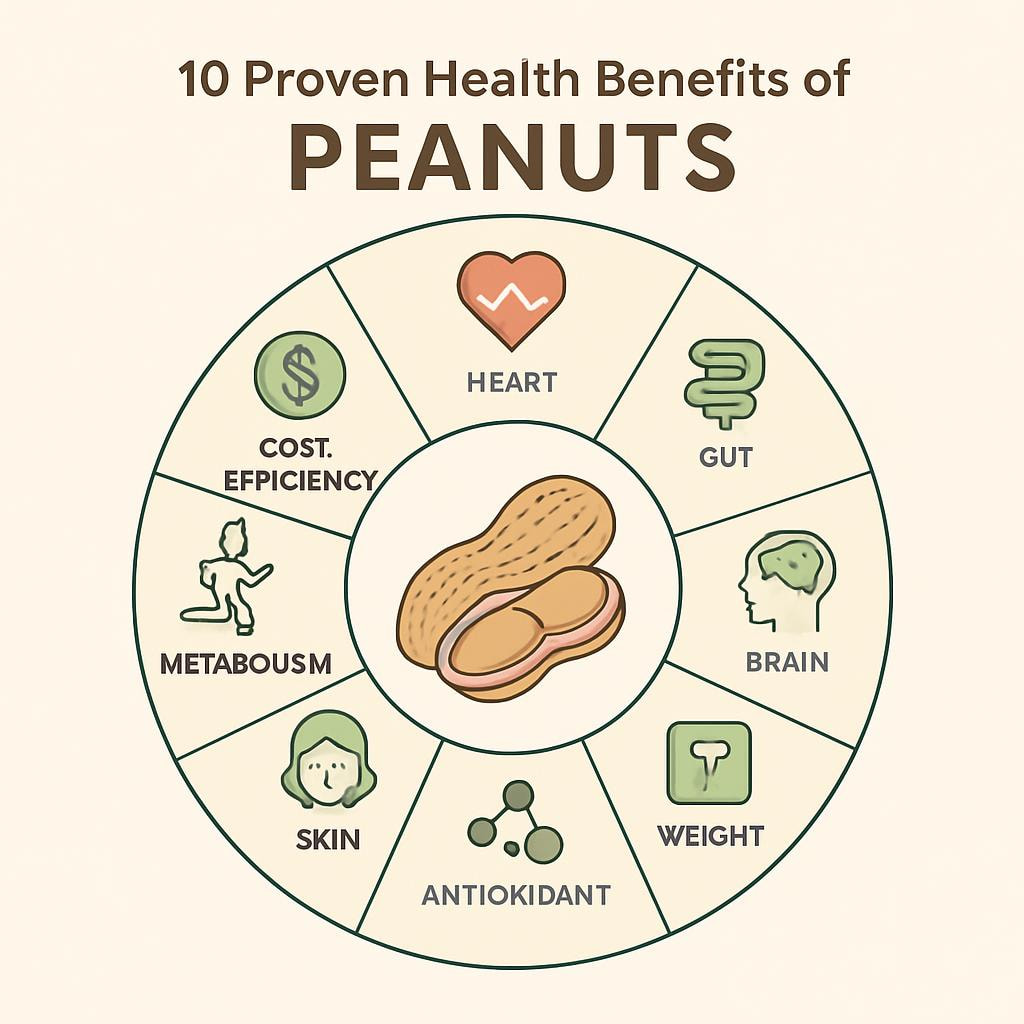
Nutritional Profile of Peanuts (per 100 g)
Below is the updated nutritional composition of raw, unsalted peanuts based on USDA FoodData Central (2024) values.
| Nutrient | Amount (per 100 g) | Why It Matters |
|---|---|---|
| Calories | 567 kcal | High energy density; excellent for sustained energy. |
| Protein | 25.8 g | Builds and repairs tissues; supports muscle and enzyme function. |
| Total Fat | 49.2 g | Mostly heart-healthy monounsaturated and polyunsaturated fats. |
| Carbohydrates | 16.1 g | Provides slow, steady energy. |
| Dietary Fiber | 8.5 g | Supports digestion and helps regulate blood sugar levels. |
| Magnesium | 168 mg (40% DV) | Essential for muscle, nerve, and heart function. |
| Potassium | 705 mg (15% DV) | Supports healthy blood pressure and fluid balance. |
| Niacin (Vitamin B3) | 12 mg (75% DV) | Aids in energy metabolism and brain health. |
| Vitamin E | 8.3 mg (55% DV) | Acts as an antioxidant protecting cells from oxidative damage. |
| Folate | 240 µg (60% DV) | Supports red blood cell production and DNA synthesis. |
Key Takeaway:
Peanuts are a nutritional powerhouse — rich in plant-based protein, fiber, and healthy fats. Their impressive vitamin and mineral profile supports multiple aspects of health, including heart function, metabolism, and cellular protection. When eaten in moderation as part of a balanced diet, peanuts can meaningfully contribute to overall wellness and longevity.
(Source: USDA FoodData Central, 2024)
10 Proven Health Benefits of Peanuts
Below are ten benefits supported by scientific research, carefully phrased to remain factual, evidence-based.
1. Supports Heart Health
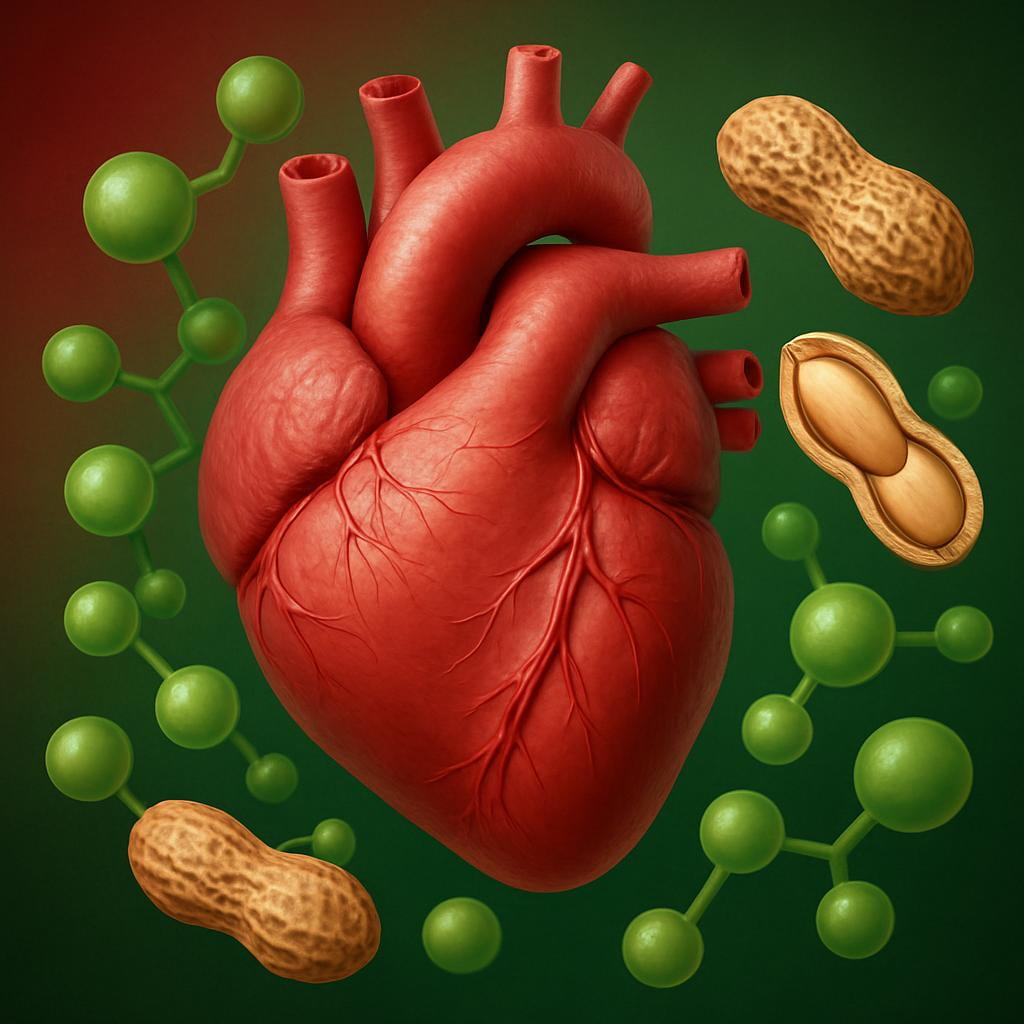
Peanuts may help maintain healthy cholesterol levels and overall cardiovascular wellness.
A meta-analysis published in the Journal of Nutrition found that regular peanut consumption was linked to lower total cholesterol, triglycerides, and LDL-to-HDL ratio — key markers of heart health (PubMed, 2021).
Another large population-based study published in Frontiers in Nutrition (2022) reported that eating peanuts two or more times per week was associated with a 13 % lower risk of cardiovascular and coronary heart disease (Frontiers in Nutrition, 2022).
Because peanuts contain heart-friendly monounsaturated and polyunsaturated fats, plus fiber and plant sterols, they may support better lipid balance and vascular function when included in a balanced diet.
2. Helps Maintain Healthy Weight and Supports Satiety

Despite being calorie-dense, peanuts may help with weight control and appetite management.
Their trio of protein, fiber, and unsaturated fats supports prolonged fullness and reduced overeating. According to EatingWell Magazine, studies show that moderate peanut consumption may enhance satiety and lead to better diet quality overall (EatingWell, 2023).
Choosing a small handful (≈ 1 oz or 28 g) as a snack can help manage hunger between meals and support healthy eating habits.
3. Supports Blood Sugar Balance
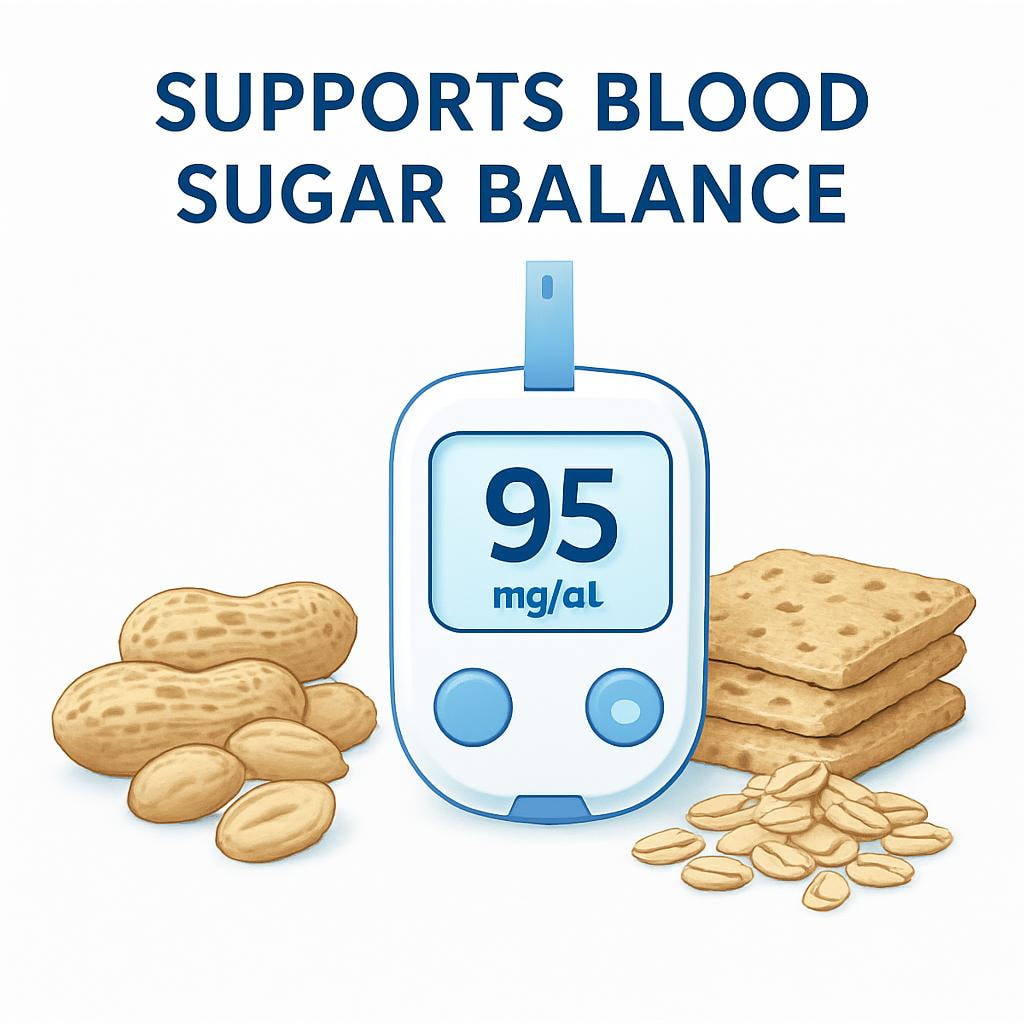
Peanuts have a low glycemic index, meaning they release glucose slowly and may help stabilize blood sugar after meals.
Research from the National Library of Medicine (PMC) found that peanut consumption can improve insulin sensitivity and post-prandial glucose control in adults at risk for diabetes (PMC, 2016).
The combination of healthy fats, protein, and fiber supports smoother blood-sugar responses — especially when peanuts replace refined carbohydrate snacks.
4. Rich Source of Plant-Based Protein
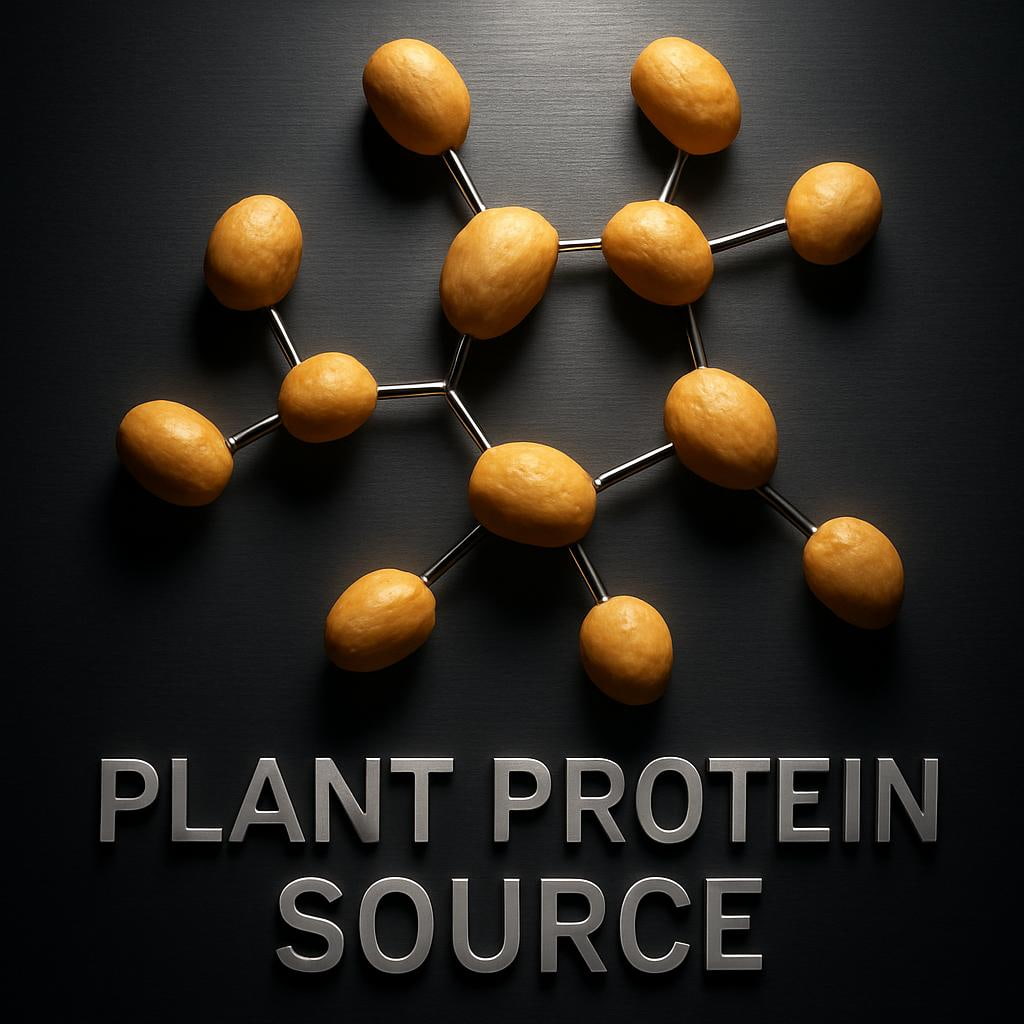
Peanuts provide around 25 grams of protein per 100 grams, making them one of the richest plant protein sources among legumes and nuts.
A review in the U.S. National Library of Medicine confirmed that peanuts contain all 20 amino acids in varying proportions, including arginine, which supports blood flow and muscle health (PMC, 2016).
This makes peanuts an excellent option for vegetarians, vegans, and athletes seeking convenient, nutrient-dense protein.
5. High in Essential Vitamins and Minerals
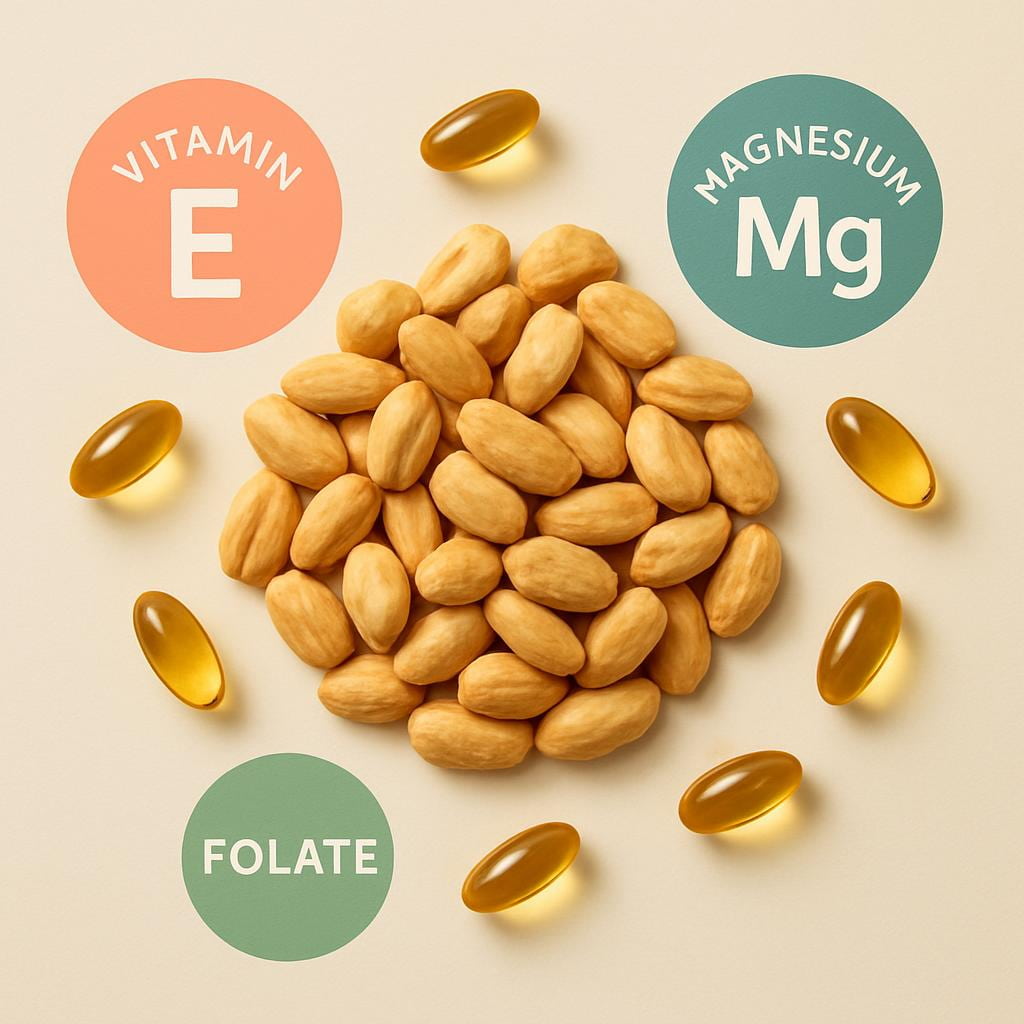
Peanuts are naturally rich in niacin (vitamin B3), vitamin E, magnesium, manganese, and folate — nutrients that support energy metabolism, antioxidant defense, and nervous-system function.
According to Medical News Today, these micronutrients collectively help maintain energy balance, protect cells from oxidative stress, and promote healthy skin and brain function.
Regularly including peanuts in meals may help close common nutrient gaps.
6. Contains Antioxidant and Anti-Inflammatory Compounds
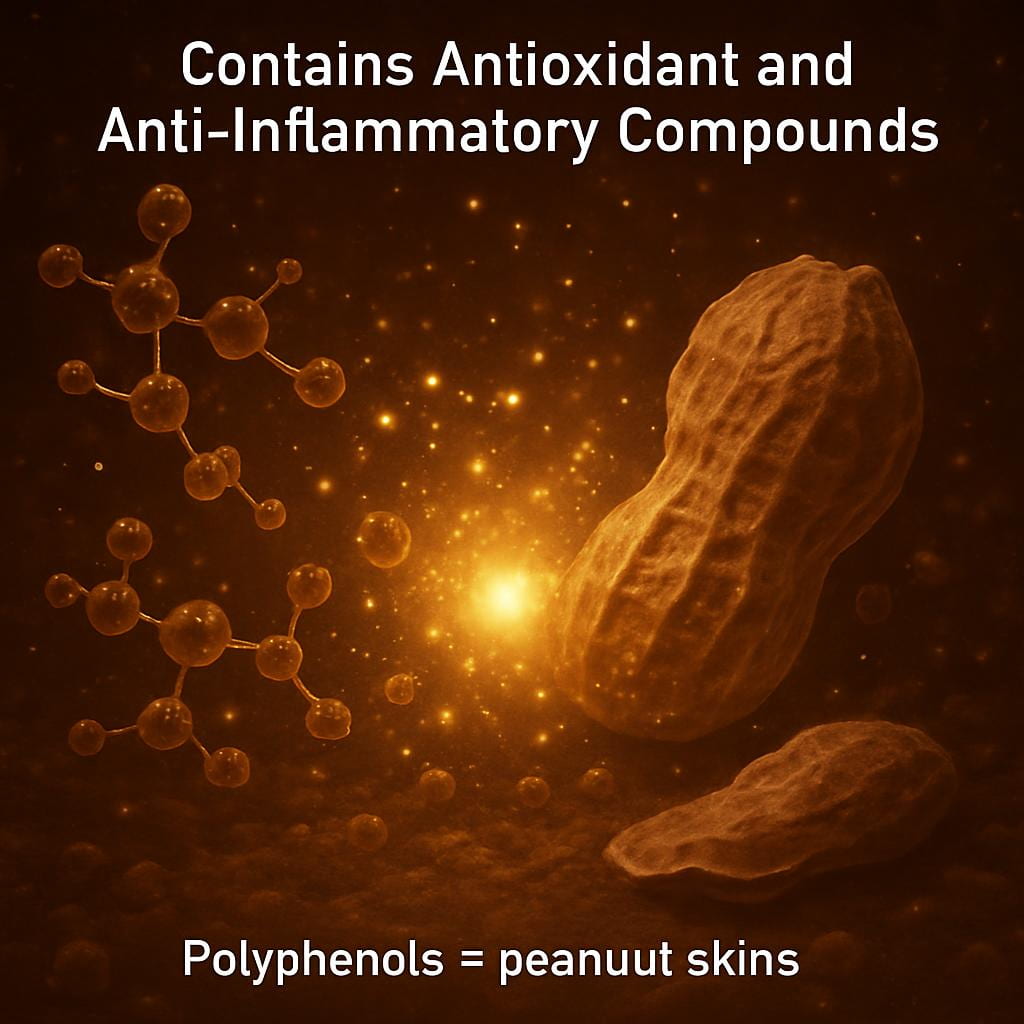
Peanuts and their skins contain potent bioactive compounds such as resveratrol, flavonoids, and phenolic acids, which contribute to antioxidant activity.
The U.S. Department of Agriculture (USDA ARS) reported that peanut skins exhibit antioxidant capacity comparable to that of green tea and grape skins (USDA ARS, 2022).
These natural compounds may help combat oxidative stress and support inflammatory balance, contributing to long-term wellness and cellular protection.
7. Associated with Reduced Overall Mortality

Large epidemiological studies have shown that higher nut and peanut consumption correlates with lower all-cause and cardiovascular mortality.
A major analysis published in JAMA Internal Medicine found that frequent peanut consumers had a significant reduction in total mortality risk, especially from heart disease (JAMA Network, 2015).
While these are observational data (not proof of causation), the findings support the inclusion of peanuts as part of a longevity-supporting diet.
8. Supports Brain and Cognitive Health

Peanuts contain niacin, vitamin E, healthy fats, and polyphenols, all of which support brain and nerve function.
A 2024 study in Frontiers in Nutrition found that regular nut intake (including peanuts) may be linked to better memory, attention, and cognitive performance in adults (Frontiers in Nutrition, 2024).
Though evidence is early, peanuts’ nutrient profile suggests they may help maintain cognitive health as part of a balanced, brain-friendly diet.
9. May Aid in Better Digestive Health
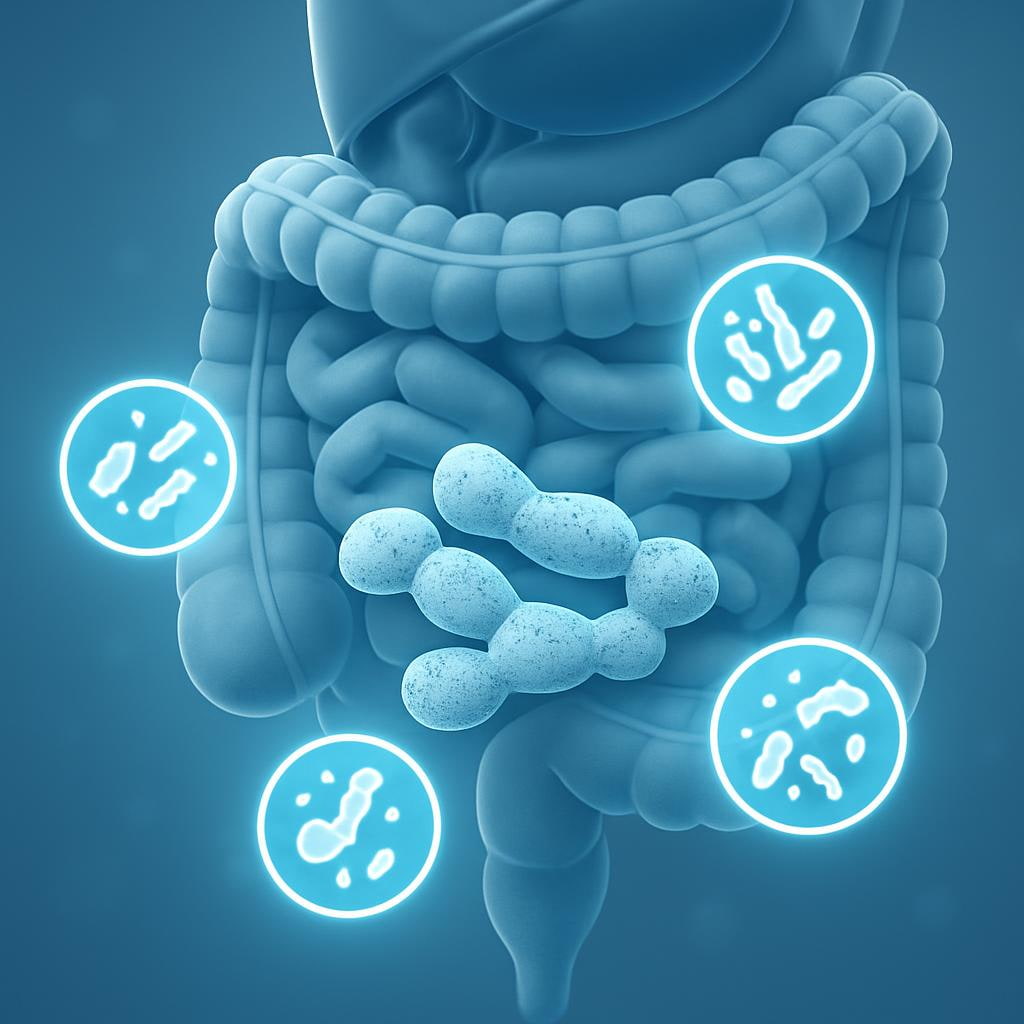
Peanuts are a good source of dietary fiber, providing about 8 grams per 100 grams, which supports digestive regularity and a healthy gut microbiome. Fiber serves as a fuel source for beneficial gut bacteria, helping produce short-chain fatty acids (SCFAs) — compounds like butyrate that promote colon health and maintain the intestinal barrier.
A 2023 review published in the National Library of Medicine reported that regular consumption of nuts such as peanuts and pistachios may promote the growth of beneficial gut bacteria that produce SCFAs, contributing to gut and metabolic health (MDPI, 2023).
Similarly, a controlled study noted that including nuts in the diet can modestly support microbiome diversity and enhance gut resilience without adverse effects (National Institutes of Health (NIH) – PMC, 2022).
When enjoyed as part of a plant-forward, fiber-rich eating pattern, peanuts may support smoother digestion, improved microbiome balance, and long-term gastrointestinal well-being.
(References: MDPI – Foods Journal, 2023; NIH PubMed Central, 2022)
10. Cost-Effective Nutrition and Sustainable Choice
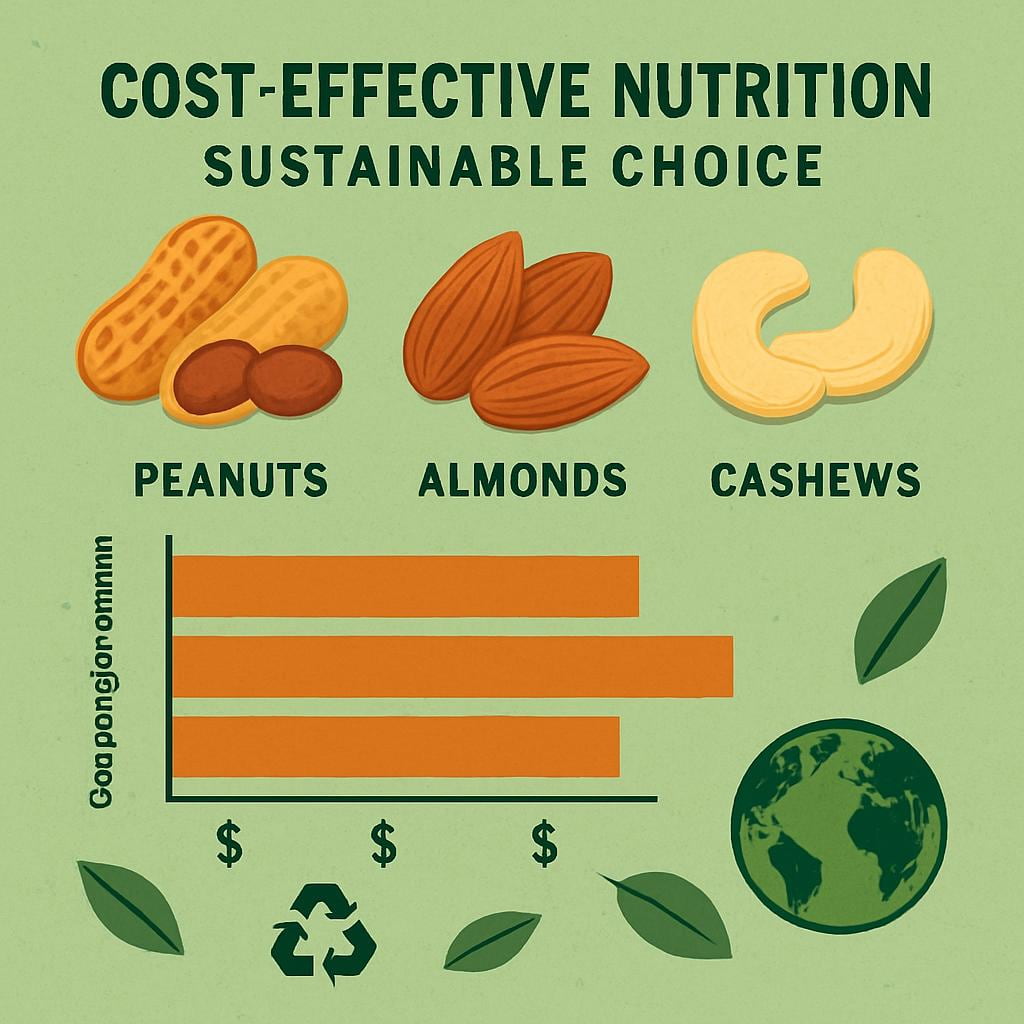
Unlike many tree nuts, peanuts are affordable, protein-dense, and environmentally efficient.
A Harvard Health Publishing review highlighted that peanuts offer comparable heart-health and longevity benefits to pricier nuts, making them an economical way to add nutrient-rich foods to your diet (Harvard Health Publishing, 2015).
Additionally, peanut farming requires fewer resources and water than almond or cashew production, making it a sustainable protein source for both health and the planet.
How to Eat Peanuts for Maximum Benefits
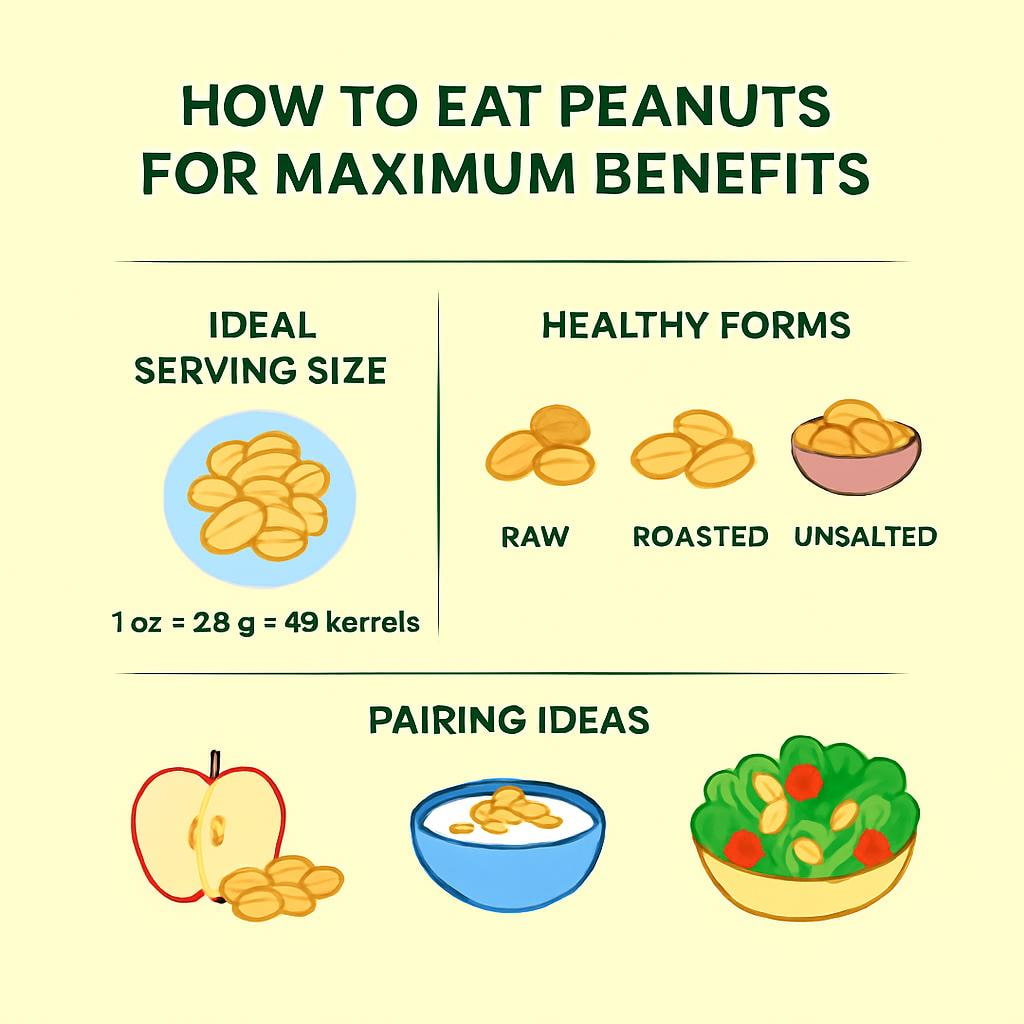
Peanuts can be a delicious and practical addition to your daily nutrition when eaten in the right amounts and forms. The key is portion control and preparation method.
Recommended Serving Size:
The ideal serving is about 1 ounce (28 g) — roughly a small handful or around 49 kernels. This portion provides approximately 160–170 calories, 7 grams of protein, and 2 grams of fiber, making it a satisfying, nutrient-rich snack.
Best Forms to Eat:
- Raw or dry-roasted unsalted peanuts: retain most nutrients and avoid excess sodium.
- Boiled peanuts: higher in antioxidants and polyphenols.
- Natural peanut butter: choose varieties with no added sugar, hydrogenated oils, or salt.
Smart Pairing Ideas:
- Add peanuts to yogurt, fruit salads, or oatmeal for extra protein and crunch.
- Combine with vegetables or whole grains for balanced energy and sustained fullness.
- Use peanuts as a post-workout snack to replenish nutrients and support muscle recovery.
Timing Tips:
Peanuts are best enjoyed:
- As a mid-morning or afternoon snack to curb cravings.
- After exercise for nutrient recovery.
- As a meal topper to boost texture and satiety.
According to Harvard T.H. Chan School of Public Health, replacing refined carbohydrates or processed snacks with nuts like peanuts may improve heart and metabolic health outcomes.
Possible Side Effects and Precautions
While peanuts are highly nutritious, moderation and awareness of certain safety factors are essential — especially for those with allergies or specific health concerns.
1. Peanut Allergy:
Peanut allergy is one of the most common and serious food allergies, sometimes causing life-threatening anaphylaxis. People with known allergies must strictly avoid peanuts and peanut-based foods. The American Academy of Allergy, Asthma & Immunology (AAAAI) advises working with an allergist for diagnosis, management, and emergency planning, including use of an epinephrine auto-injector when prescribed.
2. Aflatoxin Contamination:
Improperly stored peanuts can develop Aspergillus mold that produces aflatoxins, toxins harmful to the liver if consumed in excess. The U.S. Food and Drug Administration (FDA) monitors and regulates aflatoxin levels to protect consumers. To reduce risk, buy from trusted sources, store peanuts in a cool, dry place (≤ 40 °F / 4 °C), and discard any with mold or off smells.
3. Calorie Density and Weight Control:
Peanuts are calorie-dense — about 567 kcal per 100 g. Overeating can lead to excess calorie intake and weight gain. Stick to the 1 oz (28 g) serving to enjoy benefits without exceeding energy needs.
4. Medication Interactions:
Peanuts generally have no major drug interactions but may affect those on blood thinners or lipid-lowering medications due to their vitamin E and fat content. Consult your doctor if you take such medications regularly.
5. Pregnancy and Breastfeeding:
Peanuts are safe for most pregnant or breastfeeding women when eaten in moderation, offering valuable nutrients like folate and healthy fats. However, those with a personal or family history of peanut allergy should consult a healthcare professional before introducing them.
(Source: National Institutes of Health (NIH))
Storage and Food Safety Tips
Proper storage is essential to maintain the freshness, flavor, and safety of peanuts. According to the U.S. Food and Drug Administration (FDA), correct temperature control and moisture prevention are key to reducing the risk of spoilage and contamination.
Best Storage Practices:
- Use airtight containers: Prevents exposure to air, odors, and moisture that can cause rancidity or mold growth.
- Store in a cool, dark place: Keep peanuts in a pantry away from sunlight or, for longer shelf life, in the refrigerator at or below 40 °F (4 °C).
- Refrigerate or freeze bulk peanuts: If buying in large quantities, divide portions and refrigerate or freeze them to preserve freshness.
- Avoid heat and humidity: Warm or damp conditions can promote aflatoxin-producing mold growth.
- Inspect before use: Discard peanuts with a rancid smell, discoloration, or visible mold, as these indicate spoilage.
A detailed report from UC Davis Food Safety Division also recommends cold, dry storage for nuts and legumes to prevent oxidation and contamination.
By following these storage and hygiene steps, you ensure your peanuts stay safe, nutrient-rich, and high in quality for several months — protecting both your health and the food’s nutritional integrity.
Frequently Asked Questions (FAQs)
Q1. Are peanuts good for heart health?
Yes. Peanuts contain unsaturated fats, fiber, and plant sterols that support healthy cholesterol levels and heart function.
(Harvard Health Publishing)
Q2. Can I eat peanuts daily?
Yes, if portion-controlled. Eating about 1 oz (28 g) daily can provide benefits without excessive calories.
Q3. Are boiled peanuts healthier than roasted ones?
Boiled peanuts have slightly fewer calories and higher antioxidant levels than roasted peanuts, according to studies in Food Chemistry.
Q4. Can peanuts help control blood sugar?
Yes, peanuts have a low glycemic index and may help maintain stable blood sugar levels, especially when paired with high-fiber foods.
(NIH PubMed Central)
Q5. Is peanut butter as healthy as whole peanuts?
Natural peanut butter provides similar nutrients but choose brands without added sugars or hydrogenated oils for best results.
Q6. Can children safely eat peanuts?
Yes — most children can safely eat peanuts unless they have a known allergy. The American Academy of Pediatrics (AAP) recommends introducing peanut-containing foods around 4–6 months to help reduce allergy risk, under medical guidance for high-risk infants.
Avoid whole peanuts for young children due to choking hazards — instead, use smooth or thinned peanut butter in small amounts. Once tolerated, peanuts can be a nutritious part of a child’s balanced diet.
Q7. How long do peanuts stay fresh?
Stored in airtight containers in a cool environment, peanuts can last up to 9 months in the pantry or 12 months in the refrigerator.
Conclusion
Peanuts are a nutrient-dense, affordable, and versatile food that may support heart, brain, digestive, and metabolic health when consumed mindfully. Their rich blend of protein, healthy fats, fiber, and essential nutrients makes them a smart snack for everyday wellness.
Enjoying a small handful of unsalted or dry-roasted peanuts daily can enhance dietary quality, provided you practice moderation and proper storage. For individuals with allergies or medical conditions, consult your healthcare provider before making major dietary changes.
This content is for informational purposes only and not medical advice.
References
- PubMed – Effect of Peanut Consumption on Cardiovascular Risk Factors: A Meta-analysis of Clinical Trials (2021)
- Frontiers in Nutrition – Tree Nut and Peanut Consumption and Risk of Cardiovascular and Coronary Heart Diseases (2022)
- JAMA Internal Medicine – Nut and Peanut Consumption and Total and Cause-Specific Mortality (2015)
- MDPI Foods Journal – Effects of Peanut and Pistachio Consumption on Gut Microbiota (2023)
- American Academy of Pediatrics (AAP) – When to Introduce Peanut Butter and Other Common Food Allergens to Your Baby
